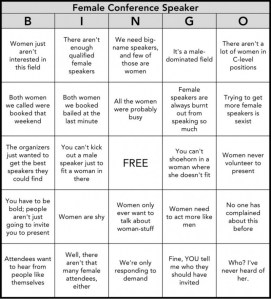A very interesting workshop was organized on November 24-25 by the Netherlands-Flemish Institute in Cairo (NVIC) titled: “Female Actors in Islamic Public Sphere – Increasing Significance through Increasing Mediatization.” This was a great conference, and I wish I could recap it all for you. But I’ll keep my review to the media-related panels.
Maria Roeder from Mannheim University discussed how private life could be highly political: she raised the questions of who is defining what is public and what is private, and also who speaks in the talk shows, because half the speakers only represent themselves, and in terms of gender, males to females ratio is 100 to zero:
“The dominance of male actors is a trend in such shows, there’re high barriers for female voices in political talk shows.” She continues: “The concept of public sphere empowerment is highly connected to the female almost-absent appearance and involvement in talk shows.”
She then explained that there’s a big problem when one tries to identify what is “private” and what is “public:” “The whole idea of domestic violence being private matter makes it harder to be considered as an issue to be discussed by the public sphere.”
Roeder thinks that increasing the mediatization of life world opens new spaces to public participation, which leads to increased female voices. Blogging helps in circulating news and actions away from the government and official spheres, lowers the barriers in economical terms, and does not take into account who you are, which leads to more gender equality. Though the fact remains that the Arab blogsphere is still dominated by males, at certain ages, half the bloggers are women. She then used the example of Ghada Abdel Al, the Egyptian blogger whose blog “Wanna be a Bride” was published as a book and turned into a TV series starring Tunisian actress Hend Sabry.
Another presentation was Female Preachers and Media by Gihan Abou-Zeid, Policy Adviser for the Egyptian Ministry of Family Affairs.
After introducing the background of Islamic preaching in Egypt, Abou-Zeid stated that the relation between women and mosques started to evolve dramatically in the past ten years. She gave us a map-like description for female preachers in Egypt. Politically speaking, there are organizations like the Muslim Brotherhood. Socially and economically, they come from very diverse backgrounds representing a very wider range of the Egyptian society, more than the men preachers:
“Fifteen years ago, the Egyptian society started to witness female preachers. Most if not all, started at their own homes while they are attending classes to get certified. Part of the new relationship between the state and the women preachers is allowing them to have their own activities under their umbrella and inside the mosques building, to be under their own supervision and close observation.” [sic]
Regarding female preachers’ messages, Abou-Zeid said they vary, though they have one thing in common: strengthening the role of women and their involvement in the society not through western but Islamic values. The message always portrays women as members of the family and not individuals (which male preachers do), which increased societal acceptance of female preachers, since society views family as a woman’s role.
According to Abou-Zeid, the relation between media and preachers is interesting when you compare female and male ones. While media supports and creates male preachers, there’s a gap between the spaces allowed to men in comparison to women. The limited media voice is an indication of lack of the female voice in general rather than a media-sponsored limitation: there’s very restricted Arab female representation at all levels, including religious levels, and women lack full access to decision making process in all faith-based and religious institutions.
But other factors account for a lack of female voice: female preachers also refuse to appear on TV because some think it’s haram. Also, many female preachers have families and are more comfortable in an informal setting. Male preachers stick to media channels, while female preachers choose to get more personal with a fewer number of followers.
Finally, Abou-Zeid raised the most important question on which the whole discussions in the workshop evolved: Is this really women’s empowerment? Is the fact that women just physically exist in the Islamic discourse enough to be considered it empowerment? Or should we look closer to their messages?
While some saw the fact that male preachers see the necessity of having female partners as a step forward, others saw it as just a feminist panacea from those men, while the truth is that they make sure to pick women whose messages will serve their patriarchal ideology well.
Later, Adel Abdelsadek, from Al–Ahram Center for Political and Strategic Studies presented a brief look on the blogosphere in Egypt with the main focus on female Egyptian bloggers.
His first point was the fact that anonymity formed a revolution in blogging for females: the fact that a woman can speak up without mentioning her name, age, or even her gender was a very important reason why feminist blogging has been increasing in Egypt.
Then he had an interesting take on why he thinks the new media was much helpful and more used in the Arab world more than the West. According to Abdelsadek, new media bypasses the bureaucratic process of being politically involved in the society (not to mention the instability of the opposition in Egypt) and ends the female limitation on being politically integrated into society.
Then he asked a question: Is feminist blogging related to the gender of the blogger or the nature of the content? For example, he considers a male blogger feminist for attacking female sexual harassment on his blog.
Finally, Abdelsadek expressed the sentiment that he doesn’t see online activism as able to lead to a real societal change—bloggers and activists must transfer their efforts to the real life at a certain point of time if they actually intend to be part of that change.
Stay tuned–tomorrow I’ll discuss the rest of the conference!











